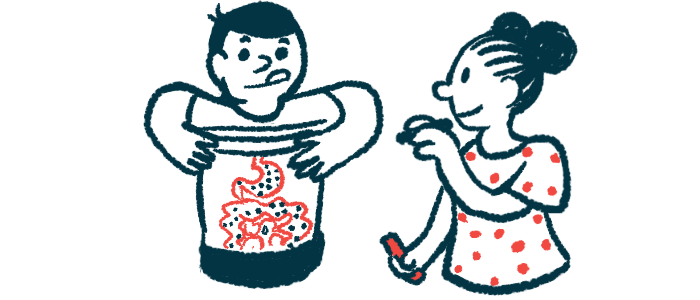Gut bacteria Bifidobacteria breaks down levodopa: Study
The findings may help inform medication management in Parkinson's
Written by |

Bifidobacteria, a type of bacteria found at higher levels in the gut of Parkinson’s disease patients, is capable of breaking down levodopa, the gold-standard therapy for the neurodegenerative disease, according to recent laboratory studies.
Levels of the bacteria in the guts of Parkinson’s patients correlated with the dose of levodopa they were using.
Still, the efficiency of Bifidobacteria in breaking down the medication before it is able to reach the brain is likely quite low. So, while the findings “may help inform medication management in [Parkinson’s],” the researchers cautioned that the findings do not establish Bifidobacteria as harmful to patients using levodopa.
The study, “A novel pathway of levodopa metabolism by commensal Bifidobacteria,” was published in Scientific Reports.
The dominant feature of Parkinson’s is a loss of nerve cells that produce dopamine, a brain-signaling chemical. Levodopa, or L-DOPA, a dopamine precursor molecule, is prescribed to most patients to help boost dopamine production.
Taken orally, L-DOPA is absorbed in the gastrointestinal tract and then travels through the circulatory system to the brain, where it is converted into dopamine inside nerve cells.
A tight-knit layer of cells called the blood-brain barrier (BBB) protects the brain from potentially harmful substances in circulation, but it also is a hurdle for getting medications into the brain. L-DOPA can cross this barrier, but dopamine itself can’t. For the therapy to be most effective, it is important that levodopa is not converted to dopamine before it can get to the brain.
To prevent the conversion from happening too soon, L-DOPA is almost always given with other medications (e.g., carbidopa) that inhibit the enzymes necessary for the conversion to occur. Those inhibitors can’t cross the BBB, so they only take effect in the rest of the body. This also prevents dopamine-associated side effects that could occur from systemic exposure.
Recent evidence, however, indicates that some bacteria living in the gastrointestinal tract also might be able to metabolize levodopa into dopamine via production of certain metabolic enzymes.
Current research in Canada
Now, the researchers explored the possibility that Bifidobacteria might have such capabilities. These bacteria are found in greater abundance in the guts of Parkinson’s patients relative to healthy people.
The analysis involved 197 Parkinson’s patients and 103 healthy people recruited at a center in Canada from January 2017 to September 2019 who had provided a fecal sample for microbial analysis.
As previously observed, Parkinson’s patients were found to have significantly more Bifidobacteria in fecal samples compared to the control group.
Parkinson’s patients with a higher abundance of Bifidobacteria — where the bacteria accounted for more than 1% of all gut bacteria — had a longer disease duration and slightly greater disease severity than patients with a lower abundance.
Strikingly, these patients also had an average levodopa dose that was 43% higher than those with lower Bifidobacteria levels. A positive correlation was observed between levodopa dose and bacteria levels, meaning that patients with higher bacteria levels needed more levodopa.
Two possible explanations
According to the scientists, there are two possible explanations for that finding. “The first is that patients with higher levels of Bifidobacterium require higher medication dose because their gut bacteria are metabolizing a significant portion and making it clinically unavailable,” the researchers wrote.
However — and researchers believe this is more plausible — Bifidobacteria may survive better in patients with higher medication doses because there is extra L-DOPA around that they can use for cellular metabolism.
“In other words, it is more likely that patients’ disease advancement and the associated increase in L-DOPA dose … drives subsequent Bifidobacterium flourishing, rather than higher Bifidobacterium abundance driving increased dose requirements,” the researchers explained.
Additional lab experiments indicated that Bifidobacteria did not directly metabolize L-DOPA into dopamine. Still, certain species did irreversibly break down L-DOPA into another metabolite called DHPLA. This was found to occur via the activity of genes linked to the metabolism of L-tyrosine, a naturally-occurring L-DOPA precursor molecule.
Bifidobacteria did not break L-DOPA down as efficiently as other bacteria, namely Enterococcus, have been found to do. Indeed, the efficiency of the metabolic reaction was “quite low,” according to the authors, especially when the bacteria had enough of other nutrients.
Researchers urge caution
As such, while the findings altogether indicate a possible role for these bacteria in breaking down L-DOPA, the authors “urge caution against over-interpreting these results.”
For patients using probiotics — combinations of bacteria expected to have beneficial effects on gut and brain health — and are experiencing positive effects, the researchers “do not suggest discontinuing probiotic administration based on the results of this study.”
Indeed, poor gut health itself can affect L-DOPA absorption and exacerbate Parkinson’s symptoms.
“Any interventions, microbial or otherwise, that restore normal gut health and function could have the added benefit of aiding with medication management and symptom relief in this population,” the team concluded.



